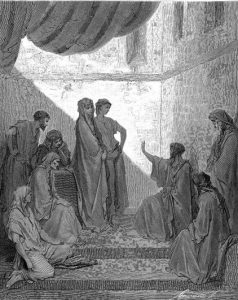Acts 2:42-47
This text is used for the Lectionary Year A on May 7, 2017.
 The heart of every churchman will warm as he or she reads this paragraph that closes this remarkable chapter. It begins with the new generation being baptized in the Holy Spirit early in the morning. When the Spirit moves into their hearts, he energizes them in worship and witness. The church of Jesus Christ takes its place in history.
The heart of every churchman will warm as he or she reads this paragraph that closes this remarkable chapter. It begins with the new generation being baptized in the Holy Spirit early in the morning. When the Spirit moves into their hearts, he energizes them in worship and witness. The church of Jesus Christ takes its place in history.
In response to the Spirit-empowered preaching of the Gospel by Peter, while being supported by the rest of the Apostles, the number in the church multiplied from 120 to 3120 in that one day. In the immediate days ahead Luke reports with descriptive words what life was like for these new believers. It is a remarkable beginning. Not one to be imitated, but a good description of what we should prayerfully expect in our churches. We should allow this passage to mold our expectations of the church where we serve. As we study this description of life in the church, we must always be mindful that these are people in whom God dwells by His Spirit. This is not a movement of men, but a movement of the Living Christ.



